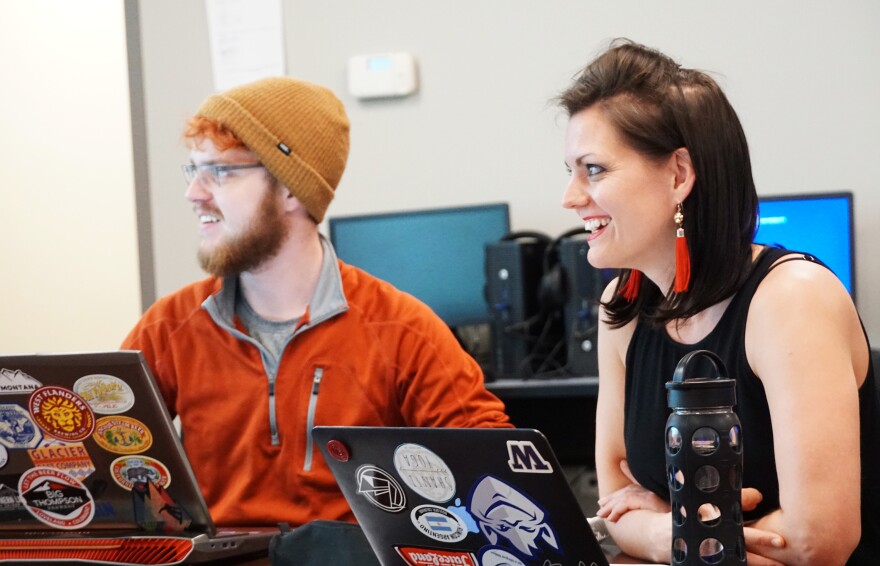It’s an all-too-familiar battle for some parents — getting their kids to stop playing video games and do their homework.
But in one classroom at St. Louis University, video games are just another learning tool, like textbooks or worksheets. The course, Intensive Italian for Gamers, is a hybrid of traditional instruction and in-class video gaming. The preliminary results are promising, with students in the class scoring higher on their finals than those in traditional Italian classes at SLU.
The course, now in its second year, is the brainchild of SLU Professor Simone Bregni.
Bregni’s love for video games goes way back — to 1975, when he discovered the classic Atari game "Pong."
“If you watch 'Stranger Things,' those kids going into the arcades? I was playing all of those games,” said Bregni, who was born and raised in Italy.
It wasn’t until a decade later, when he was in his mid-20s, that video games became more than entertainment — beginning with a game called "Alter Ego."
In the game, players answer questions about an imaginary character (“True or false: Revenge is sweet?”) and watch how their life unfolds.
Bregni played every day for several hours “with a huge paper dictionary” on his lap.
Months earlier, he had purchased a novel in English that was too difficult for him to read. After playing "Alter Ego" for several months, he picked up the book again.
“I couldn’t understand every single word, but I could navigate the overall meaning,” he said. “I started thinking, ‘Why is this happening?’ And then I realized, ‘It’s the game.’”

‘We’re not just passive viewers’
More recently, Bregni said video games have evolved into “interactive movies” — and that’s opened the door to new uses in the classroom.
Rather than simple cartoon-style depictions (think Super Mario), games are often highly realistic animations with multimillion-dollar budgets.
Players follow an unfolding narrative, interpreting information and making choices along the way. That format not only keeps the player engaged, said Bregni, it also helps facilitate learning.
“We have agency,” he said. “We’re not just passive viewers; we’re actively engaged in the game.”
Bregni uses about 10 different video games in his Intensive Italian for Gamers class, including the popular "Assassin’s Creed II" set in Renaissance Italy.

For student Lillian Jones, a self-described “language nerd,” the game has also been a lesson in history.
“Most of the history is spot on,” said Jones, a SLU masters student in Spanish. “These gangs existed, the clothes, the cobblestones and the architecture.”
Video games can provide a window into another country’s history and culture — aspects Bregni considers central to language learning.
“Language is culture,” Bregni said. “The boundaries of what are appropriate are culture based. In America, it’s totally acceptable to talk about money. In Italy, it’s a complete cultural no-no.”
While the games can provide a specific linguistic and cultural landscape, the technology does have limitations.
Many games allow you to change the language, but characters’ lip syncing is often done in English — meaning the dialogue can look like a poorly dubbed film if the language is changed.
Measuring results
SLU junior Brian Heneghan was drawn to the class because he loves video games — he calls them a “pretty big portion” of his life.
On his forearm, he has a tattoo inspired by one of his favorite games, an action role-playing game called "Kingdom Hearts."
“I’m drawn toward games as a medium of art,” Heneghan said.
He’s taken other language classes, including Spanish and German, but he said this is the first that incorporates video games.

The class format works for him because he’s a hands-on learner — and he said he feels motivated to practice in his free time, by changing the language to Italian on other video games he plays.
“As the semester was progressing, I was actually picking up a lot more on the language and picking up a lot more on even the small hints that are necessary to understand the story of the game,” said Heneghan.
Bregni has seen the results firsthand. Last spring, students in the Intensive Italian for Gamers class had a median final-exam score two points higher than those in traditional Italian classes taught at SLU.
“What is amazing to me is that they’re able to communicate in the language and navigate complex games after the equivalent of one semester of Italian,” said Bregni.
Video games in the classroom are still a relative rarity, but they’re becoming increasingly popular at home.
A 2017 Pew Research Poll finds an overwhelming 92% of teen boys and 83% of girls play video games on a computer, game console or cell phone.
Bregni has encountered other educators who are skeptical about video games in the classroom.
Although not every teacher has the knowledge, resources or desire to incorporate games into their curriculum, he said he hopes they’ll consider it.
“You don’t have to become an expert all of the sudden,” Bregni said. “Just be open to the fact that this is a relevant part of some of our students’ lives.”
Follow Shahla on Twitter: @shahlafarzan
Send questions and comments about this story to feedback@stlpublicradio.org



